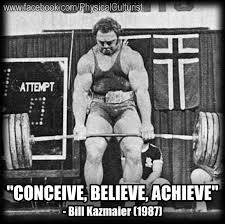Neuroscience and the Power of YES!
Before I ever took a neurobiology class, I knew that the things I really set my mind out to do usually got done. I just didn't know exactly why or how. As a young power-lifter, there were days that I could walk up to a weight and lift anything, and the very next day half that weight felt like a million pounds. For the longest time I couldn't figure out how that could be. How could I lose that much strength in one day? Had I lost that much muscle over night?
 One day while working out at my local gym in Galveston Texas, I was preparing for a deadlift, when out of the corner of my eye I saw a huge man walking up to the front door. This guy wasn't just big, you could actually feel his presence approaching as he got closer. It didn't take me long to realize that this person looked very familiar. After a hesitant introduction, he identified himself as no other than Bill Kazmaier (The Kaz, 3 time strongman champion in 81,82, and 1983 and now world strongman announcer). This guy is a legend, and a personal hero of mine for years, so I "offered" to let him lift with me and a few of my training partners (as we were training for an upcoming power lifting meet). He was gracious enough to hang out with us while we lifted. Kaz was not only a legend and a behemoth of a man, but also one of the nicest guys I have ever met.
One day while working out at my local gym in Galveston Texas, I was preparing for a deadlift, when out of the corner of my eye I saw a huge man walking up to the front door. This guy wasn't just big, you could actually feel his presence approaching as he got closer. It didn't take me long to realize that this person looked very familiar. After a hesitant introduction, he identified himself as no other than Bill Kazmaier (The Kaz, 3 time strongman champion in 81,82, and 1983 and now world strongman announcer). This guy is a legend, and a personal hero of mine for years, so I "offered" to let him lift with me and a few of my training partners (as we were training for an upcoming power lifting meet). He was gracious enough to hang out with us while we lifted. Kaz was not only a legend and a behemoth of a man, but also one of the nicest guys I have ever met.
To make a long story short, I had the opportunity to train with Kaz a few times when he came into town, and in that short amount of time he taught me some things that have stuck with me the rest of my life. One tactic that he used with his training partners was to have the lifter turn away from the bar as it was being loaded. The training partners would load the weight onto the bar for the lifter. He explained that if the lifter had his mind in the right place, it didn't matter how much weight was on the bar, the lift was a success or a failure long before the lifter ever touched the bar. It took me some time to really understand the implications of that story, "the lift happened before the lifter ever touched the bar."
 Today there are a few things I have learned along the way that have allowed me to understand this concept more clearly. The brain is a funny and amazing regulatory system. It is (very, very simplistically stated) a system of inhibitory and stimulatory signals that are always happening in unison, just at different levels at different times, depending on what you are asking it to do. At times when excitation is required, stimulatory mediators (neurotransmitters) are amplified and inhibitory mediators are suppressed. At times when inhibition is appropriate, inhibitory mediators are activated and excitatory ones are suppressed. It is a beautiful balance that allows you to run from the bear when being chased, and still sleep that night (assuming you escaped from the bear).
Today there are a few things I have learned along the way that have allowed me to understand this concept more clearly. The brain is a funny and amazing regulatory system. It is (very, very simplistically stated) a system of inhibitory and stimulatory signals that are always happening in unison, just at different levels at different times, depending on what you are asking it to do. At times when excitation is required, stimulatory mediators (neurotransmitters) are amplified and inhibitory mediators are suppressed. At times when inhibition is appropriate, inhibitory mediators are activated and excitatory ones are suppressed. It is a beautiful balance that allows you to run from the bear when being chased, and still sleep that night (assuming you escaped from the bear).
Applying this concept to the weight room, with the new understanding that we can control much about what our brain does chemically, this gives us some insight into why loading your own bar might impact your maximum lifting ability. During the time it takes to load the weights on the bar, the lifter has time to think about how heavy the lift is, question his ability, doubt his skill, and fear his failure. All of these feelings come with a neurochemical response that elevate inhibition and suppress his excitatory brain chemistry. Simply put, it gives him time to talk his brain out of the lift. Conversely, being turned away from the bar as it is being loaded, eyes closed, focused on the mechanics of the perfect lift, visualizing the emotions of successful completion, with no fear, with no hesitation, with no questioning, the bar comes up with ease.
Here is some basic neuroscience that explains the chemistry of our brains; just in case you are interested.

WHAT ARE NEUROTRANSMITTERS?
Neurotransmitters are the brain chemicals that communicate information throughout our brain and body. They relay signals between nerve cells, called "neurons." The brain uses neurotransmitters to tell your heart to beat, your lungs to breathe, and your stomach to digest. They can also affect mood, sleep, concentration, weight, and can cause adverse symptoms when they are out of balance. Neurotransmitter levels can be depleted many ways. As a matter of fact, it is estimated that 86% of Americans have suboptimal neurotransmitter levels. Stress, poor diet, neurotoxins, genetic predisposition, drug (prescription and recreational), alcohol and caffeine usage can cause these levels to be out of optimal range.
There are two kinds of neurotransmitters - INHIBITORY and EXCITATORY. Excitatory neurotransmitters are not necessarily exciting - they are what stimulate the brain. Those that calm the brain and help create balance are called inhibitory. Inhibitory neurotransmitters balance mood and are easily depleted when the excitatory neurotransmitters are overactive.
Inhibitory Neurotransmitters
SEROTONIN is an inhibitory neurotransmitter - which means that it does not stimulate the brain. Adequate amounts of serotonin are necessary for a stable mood and to balance any excessive excitatory (stimulating) neurotransmitter firing in the brain. If you use stimulant medications or caffeine in your daily regimen - it can cause a depletion of serotonin over time. Serotonin also regulates many other processes such as carbohydrate cravings, sleep cycle, pain control and appropriate digestion. Low serotonin levels are also associated with decreased immune system function.
GABA is also an inhibitory neurotransmitter that is often referred to as "nature's VALIUM-like substance". When GABA is out of range (high or low excretion values), it is likely that an excitatory neurotransmitter is firing too often in the brain. GABA will be sent out to attempt to balance this stimulating over-firing.
DOPAMINE is a special neurotransmitter because it is considered to be both excitatory and inhibitory. Dopamine helps with depression as well as focus, which you will read about in the excitatory section.
Excitatory Neurotransmitters
DOPAMINE is our main focus neurotransmitter. When dopamine is either elevated or low - we can have focus issues such as not remembering where we put our keys, forgetting what a paragraph said when we just finished reading it or simply daydreaming and not being able to stay on task. Dopamine is also responsible for our drive or desire to get things done - or motivation. Stimulants such as medications for ADD/ADHD and caffeine cause dopamine to be pushed into the synapse so that focus is improved. Unfortunately, stimulating dopamine consistently can cause a depletion of dopamine over time.
NOREPINEPHRINE is an excitatory neurotransmitter that is responsible for stimulatory processes in the body. Norepinephrine helps to make epinephrine as well. This neurotransmitter can cause ANXIETY at elevated excretion levels as well as some "MOOD DAMPENING" effects. Low levels of norepinephrine are associated with LOW ENERGY, DECREASED FOCUS ability and sleep cycle problems.
EPINEPHRINE is an excitatory neurotransmitter that is reflective of stress. This neurotransmitter will often be elevated when ADHD like symptoms are present. Long term STRESS or INSOMNIA can cause epinephrine levels to be depleted (low). Epinephrine also regulates HEART RATE and BLOOD PRESSURE.
The lessons to be learned in this conversation can be applied to every aspect of life. With everything we do, we always have a balance of "yes" and "no" going on in our brains. Successful people are able to amplify their "yes I can" while silencing their "no I can't" through meditation, visualizaiton and mental training. Rarely do we step up to a task without deciding before hand whether or not the task will be successfully completed. Mental toughness isn't just something you are born with. It is trained, developed, and then harvested. Remember....YES YOU CAN!
Question?
If you could accomplish anything, just by amplifying the "yes", what would it be?
Reference:
http://www.neurogistics.com/TheScience/WhatareNeurotransmi09CE.asp
Latest X Factor post
Is your body saying you're old, but your mind isn't willing to give in? If you've ever felt discouraged by the challenges of health & fitness after 40, we've got a few tips, and a toolbox to help.
View BlogReceive "20 Ideas to Streamline Your Wellness Routine."
 Sign up for our "Weekly Wellness Tip" and get your free report "Simple Choices, Lasting Changes: 20 Ideas to Streamline Your Wellness Routine." The report gives you simple, smart ideas that can help you feel better and be more productive during your work day.
Sign up for our "Weekly Wellness Tip" and get your free report "Simple Choices, Lasting Changes: 20 Ideas to Streamline Your Wellness Routine." The report gives you simple, smart ideas that can help you feel better and be more productive during your work day.

Leave a Comment
Comments (0)